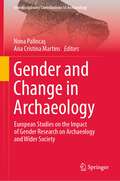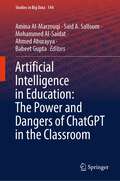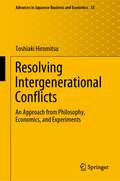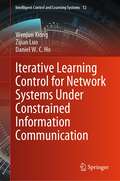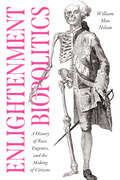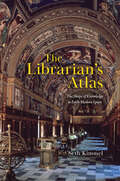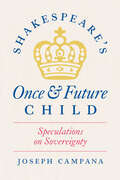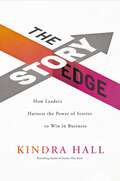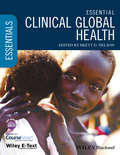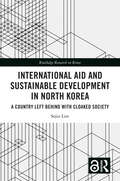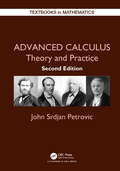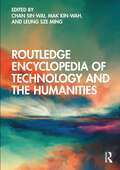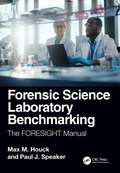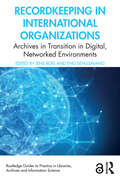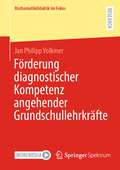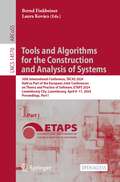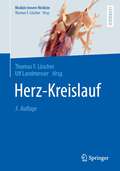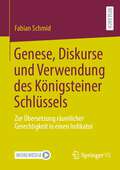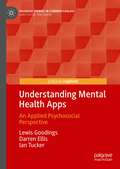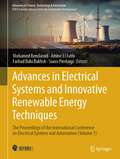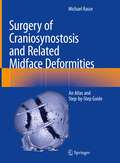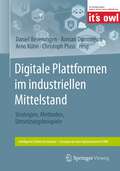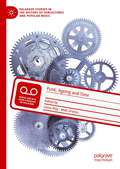- Table View
- List View
Gender and Change in Archaeology: European Studies on the Impact of Gender Research on Archaeology and Wider Society (Interdisciplinary Contributions to Archaeology)
by Nona Palincaş Ana Cristina MartinsThis volume presents the various ways in which the study of gender makes a difference in archaeological research, the archaeological academic milieu and the wider public’s thinking about gender and considers avenues of future development. It addresses questions such as why gender matters for archaeology, while examining gender from various angles (including aspects such as subjectivity, embodiment, diet, multifaceted perspectives and intersectionality) and in various periods (prehistory, Ancient Egypt, Roman antiquity, the Middle Ages and the modern and contemporary periods). It also discusses the relationship between archaeology and other academic fields involving the study of gender, as well as representations and debates on gender in the media. The theme ‘gender and change in archeology’ emerged out of concerns voiced within the ‘Archaeology and Gender in Europe’ (AGE) working community of the European Association of Archaeologists (EAA) with respect to thefuture of gender archaeology. This book unites researchers of gender archaeology from two perspectives: that of gender archaeologists from academic milieus where the study of gender has long been established and who in the meantime came to feel that this avenue of inquiry had become predictable and lost its provocative power, and that of gender archaeologists from countries where this field was only recently introduced and who, while more enthusiastic about the utility of gender archaeology, are concerned with how to disseminate it among skeptical peers. Both groups of archaeologists mainly argue that, four decades on, the study of gender in archaeology is still able to generate considerable change in our understanding of past and present-day societies. The volume is primarily of interest to archaeologists and researchers of gender studies.
Artificial Intelligence in Education: The Power and Dangers of ChatGPT in the Classroom (Studies in Big Data #144)
by Amina Al-Marzouqi Said A. Salloum Mohammed Al-Saidat Ahmed Aburayya Babeet GuptaThis book aims to bring together a collection of innovative and cutting-edge research that addresses the various challenges in the application and theoretical aspects of ChatGPT in education. ChatGPT is a large language model developed by OpenAI that has the ability to generate human-like text based on a prompt. This has significant potential for use in the field of education, as it allows for the creation of personalized, interactive learning experiences, automating assessment and grading, and more. In e-learning, ChatGPT is used to provide instant feedback and support to students, as well as generate interactive conversations in the target language for language learning. It is also integrated with existing learning management systems and educational technology platforms to enhance their capabilities. In research, ChatGPT is used for natural language processing and sentiment analysis to gather insights on student learning experiences and educational outcomes. However, it is important to note that there are also ethical and privacy concerns that come with using language models like ChatGPT in education, such as data protection and the potential for bias. Overall, the use of ChatGPT in education has the potential to revolutionize the way we learn, teach, and access information. The book seeks to publish original manuscripts that cover a broad range of topics, from the development of new chatbot technologies and their integration into the classroom, to the examination of the ethical and pedagogical implications of these systems. By compiling the latest developments in the field and highlighting new areas for exploration, this book provides valuable insights and perspectives for researchers, educators, and practitioners working in the field of ChatGPT and education. The ultimate goal is to advance the understanding of ChatGPT and its role in education and to promote its effective and responsible use in the classroom and beyond.
Resolving Intergenerational Conflicts: An Approach from Philosophy, Economics, and Experiments (Advances in Japanese Business and Economics #33)
by Toshiaki HiromitsuThis book is an unprecedented consideration of the challenges of what we can do for generations yet to come. Many growing intergenerational conflicts of interest, such as climate change and fiscal sustainability, are the result of the historically new progress of increasing human power, and the resolution of those conflicts demands a new intergenerational ethic. The book offers fresh new ideas for resolving intergenerational conflicts through the exploration of an entirely new field, conceptualized in philosophy, developed in economics, and tested in experiments. In particular, this work develops the theory of intergenerational cooperation based on a new relationship of direct reciprocity between generations. From experimental results, the possibility of intergenerational cooperation through Kantian categorical imperative is shown. The book also examines the effectiveness of inviting representatives of future generations, which are called "imaginary future generations", into the deliberations for current policy decisions. The original Japanese edition of this book was awarded the 66th Nikkei Prize for Excellent Books in Economic Science. The prize was established in 1958 to contribute to the advancement of academics and knowledge in the fields of economics, management, and accounting, as well as to its general dissemination and application.
Iterative Learning Control for Network Systems Under Constrained Information Communication (Intelligent Control and Learning Systems #12)
by Wenjun Xiong Zijian Luo Daniel W. HoThis book focuses on the subject area of Network Systems and Control Theory, providing a comprehensive examination of the dynamic behavior of networked systems operating under communication constraints. It introduces innovative iterative learning control strategies that aim to ensure stability, consistency, and security of networked systems. The field of networked systems has garnered significant interest from scientists and engineers across various disciplines, including information, electrical, transportation, life, social, and management sciences. This book consistently addresses a wide range of issues related to networked systems, emphasizing the critical impact of communication constraints on stability and security. It highlights the effectiveness and importance of iterative learning methods in tackling these challenges.Suitable for both undergraduate and graduate students interested in networked systems and iterative learning control, this book alsoserves as a valuable resource for university faculty and engineers engaged in complex systems, control theory research, and real-world applications. Its broad appeal extends to professionals working in related fields, seeking a deeper understanding of networked systems and their control mechanisms.
Enlightenment Biopolitics: A History of Race, Eugenics, and the Making of Citizens (The Life of Ideas)
by William Max NelsonA wide-ranging history tracing the birth of biopolitics in Enlightenment thought and its aftermath. In Enlightenment Biopolitics, historian William Max Nelson pursues the ambitious task of tracing the context in which biopolitical thought emerged and circulated. He locates that context in the Enlightenment when emancipatory ideals sat alongside the horrors of colonialism, slavery, and race-based discrimination. In fact, these did not just coexist, Nelson argues; they were actually mutually constitutive of Enlightenment ideals. In this book, Nelson focuses on Enlightenment-era visions of eugenics (including proposals to establish programs of selective breeding), forms of penal slavery, and spurious biological arguments about the supposed inferiority of particular groups. The Enlightenment, he shows, was rife with efforts to shape, harness, and “organize” the minds and especially the bodies of subjects and citizens. In his reading of the birth of biopolitics and its transformations, Nelson examines the shocking conceptual and practical connections between inclusion and exclusion, equality and inequality, rights and race, and the supposed “improvement of the human species” and practices of dehumanization.
The Librarian's Atlas: The Shape of Knowledge in Early Modern Spain
by Seth KimmelA history of early modern libraries and the imperial desire for total knowledge. Medieval scholars imagined the library as a microcosm of the world, but as novel early modern ways of managing information facilitated empire in both the New and Old Worlds, the world became a projection of the library. In The Librarian’s Atlas, Seth Kimmel offers a sweeping material history of how the desire to catalog books coincided in the sixteenth and seventeenth centuries with the aspiration to control territory. Through a careful study of library culture in Spain and Morocco—close readings of catalogs, marginalia, indexes, commentaries, and maps—Kimmel reveals how the booklover’s dream of a comprehensive and well-organized library shaped an expanded sense of the world itself.
Shakespeare's Once and Future Child: Speculations on Sovereignty
by Joseph CampanaA study of Shakespeare’s child figures in relation to their own political moment, as well as our own. Politicians are fond of saying that “children are the future.” How did the child become a figure for our political hopes? Joseph Campana’s book locates the source of this idea in transformations of childhood and political sovereignty during the age of Shakespeare, changes spectacularly dramatized by the playwright himself. Shakespeare’s works feature far more child figures—and more politically entangled children—than other literary or theatrical works of the era. Campana delves into this rich corpus to show how children and childhood expose assumptions about the shape of an ideal polity, the nature of citizenship, the growing importance of population and demographics, and the question of what is or is not human. As our ability to imagine viable futures on our planet feels ever more limited, and as children take up legal proceedings to sue on behalf of the future, it behooves us to understand the way past child figures haunt our conversations about intergenerational justice. Shakespeare offers critical precedents for questions we still struggle to answer.
The Story Edge: How Leaders Harness the Power of Stories to Win in Business
by Kindra HallA holistic approach to innovation, connection, and problem-solving that has no expiration date.Our stories allow us to explore our greatest desires and fears, connect with others on a deeper level, and gain a sense of clarity and purpose. In an era of chaotic change and high-pressure decision-making, Kindra Hall—author of Stories That Stick—has a message that runs counter to much of the business acumen of the day: Now more than ever, good storytelling is a critical part of successful leadership.From corporate initiatives and marketing strategies to scientific research and innovation, stories are the key ingredient to engaging audiences, building consensus, and inspiring action. The Story Edge will show you:Why storytelling is an essential part of being human.How to find and leverage the story in every situation.How to use story as a tool for positive social impact.How to craft your story in order to leave a lasting legacy.Hall masterfully interweaves storytelling theory with practical business scenarios, creating an engaging guide for present and future leaders. You'll learn how to embrace the art of storytelling and how to consider all angles of the story in every situation.If there's one thing that will remain true—despite all the transformations we experience in business, culture, and innovation—it's the importance of story. Why? Because story is the original algorithm, the true universal language. And it's one of the most important tools we, as humans, have.
Essential Clinical Global Health (Essentials)
by Brett D. NelsonEssential Clinical Global Health is a brand-new, pioneering, and evidence-based textbook that provides a clinical overview of the increasingly prominent specialty of global health. Originally developed from a course at Harvard Medical School, and now with contributions from nearly 100 world-renowned global health experts from across the globe, this textbook presents vital information required of students, trainees, and clinicians during their international experiences and training. Essential Clinical Global Health introduces readers to the up-to-date knowledge, skills, and approaches needed for productive and rewarding global health experiences. It provides essential clinical information on the diagnosis, management, and prevention of the leading causes of morbidity and mortality in low- and middle-income countries. The textbook also includes practical guidance on topics such as health systems, population-based approaches, cultural awareness and sensitivity, travel preparedness and safety, and career development in global health. With key learning objectives in each chapter, practical clinical advice, setting-appropriate guidelines, personal field experiences from student and clinician contributors, Essential Clinical Global Health is the first global health textbook with a clinical focus for healthcare students, trainees, and providers.A companion website at www.wileyessential.com/globalhealth features self-assessment questions and videos.
International Aid and Sustainable Development in North Korea: A Country Left Behind with Cloaked Society (Routledge Research on Korea)
by Sojin LimThis book examines international aid in North Korea, in particular the ongoing policy of withholding aid, through the lens of the impact on the general population to present an argument for sustainable development.Focusing on the human rights of North Koreans and presenting a case for the use of aid as a provision for social change, it explores an alternative narrative to the existing long-drawn-out rhetoric of ‘denuclearisation-first’. The book’s scope includes evaluations of the causes of international sanctions and their impact, the Kim regime’s mitigation of sanctions through marketisation and a digital economy as well as barriers to aid monitoring and the reason for the absence of any mass anti-regime movement. It also posits that North Korea is a fragile state but cloaked by the image of a strong regime.The book succinctly demonstrates that the key to unlocking the potential of North Korea’s ‘cloaked society’ does not lie in sanctions, but is to be found in engagement with development aid. As such it will appeal to students of Korean Studies, Development Studies, Asian Politics and International Relations.The Open Access version of this book, available at http://www.taylorfrancis.com, has been made available under a Creative Commons [Attribution-Non Commercial-No Derivatives (CC-BY-NC-ND)] 4.0 license.
Advanced Calculus: Theory and Practice (Textbooks in Mathematics #12)
by John PetrovicAdvanced Calculus: Theory and Practice, Second Edition offers a text for a one- or two-semester course on advanced calculus or analysis. The text improves students’ problem-solving and proof-writing skills, familiarizes them with the historical development of calculus concepts, and helps them understand the connections among different topics. The book explains how various topics in calculus may seem unrelated but have common roots. Emphasizing historical perspectives, the text gives students a glimpse into the development of calculus and its ideas from the age of Newton and Leibniz to the twentieth century. Nearly 300 examples lead to important theorems.Features of the Second Edition: Improved Organization. Chapters are reorganized to address common preferences. Enhanced Coverage of Axiomatic Systems. A section is added to include Peano’s system of axioms for the set of natural numbers and their use in developing the well-known properties of the set N. Expanded and Organized Exercise Collection. There are close to 1,000 new exercises, many of them with solutions or hints. Exercises are classified based on the level of difficulty. Computation-oriented exercises are paired and solutions or hints provided for the odd-numbered questions. Enrichment Material. Historical facts and biographies of over 60 mathematicians. Illustrations. Thirty-five new illustrations are added in order to guide students through examples or proofs. About the Author:John Srdjan Petrovic is a professor at Western Michigan University.
Routledge Encyclopedia of Technology and the Humanities
by Chan Sin-Wai Mak Kin-Wah Leung Sze MingRoutledge Encyclopedia of Technology and the Humanities is a pioneer attempt to introduce a wide range of disciplines in the emerging field of techno-humanities to the English-reading world.This book covers topics such as archaeology, cultural heritage, design, fashion, linguistics, music, philosophy, and translation. It has 20 chapters, contributed by 26 local and international scholars. Each chapter has its own theme and addresses issues of significant interest in the respective disciplines. References are provided at the end of each chapter for further exploration into the literature of the relevant areas. To facilitate an easy reading of the information presented in this volume, chapters have been arranged according to the alphabetical order of the topics covered.This Encyclopedia will appeal to researchers and professionals in the field of technology and the humanities, and can be used by undergraduate and graduate students studying the humanities.
Lorenzo Allegri: Il primo libro delle musiche. . . (Venice, 1618) (Italian Instrumental Music of the Sixteenth and Seventeenth Centuries)
by Andrew Dell’AntonioFirst Published in 1995. Il primo libro delle musiche (Venice, 1618)
Forensic Science Laboratory Benchmarking: The FORESIGHT Manual
by Max M. Houck Paul J. SpeakerForensic Science Laboratory Benchmarking: The FORESIGHT Manual takes a step-by-step instructional approach to utilizing FORESIGHT data, detailing how labs can participate in the process to improve efficiencies. The FORESIGHT Project—a business benchmarking process for forensic service providers—was created in 2008 to collect and report data while offering improvement to processes through analysis, comparisons, and best practice evaluations. The program has grown to include more than 200 participating forensic laboratories worldwide.FORESIGHT offers the capability for labs to improve core functions, provide and benefit from metrics, and thus, improve the labs capabilities and functioning for the public good, while maintaining their often limited, fixed budgets. Due to ever-increasing caseloads, forensic laboratories are constantly plagued by backlogged casework—cases submitted to the laboratory but not yet worked. This leads to inefficiencies, delays, and unhappy agencies expecting timely results. Unfortunately, even if a lab’s slates were wiped clean and the backlog were erased, many of the inefficient processes—that created the backlog—would still be in place. Eventually, and inevitably, the lab would develop a new backlog.Unique coverage and features: Presents critical and proven cutting-edge measures to utilize FORESIGHT data improve laboratory testing, operational efficiency, and policies without added additional costs. Synthesizes the data input from more than 200 labs and a decade’s worth of analytics to illustrate process improvements and the advantages of participating. Outlines how to develop data-driven responses to solve current and future problems. Forensic Science Laboratory Benchmarking will be of interest to quality assurance specialists, economists, supervisors in the parent agencies of the labs, managers at all levels of any of the hundreds of public laboratories around the world, and anyone concerned about the effectiveness and efficiency of laboratory testing. As an operational guide, the book provides a helpful roadmap to help public science agencies and forensic labs analyze how they operate, improve on what works, and change what doesn’t to better meet their mission and serve their community’s goals.
Recordkeeping in International Organizations: Archives in Transition in Digital, Networked Environments (Routledge Guides to Practice in Libraries, Archives and Information Science)
by Jens Boel Eng SengsavangRecordkeeping in International Organizations offers an important treatment of international organizations from a recordkeeping perspective, while also illustrating how recordkeeping can play a vital role in our efforts to improve global social conditions.Demonstrating that organizations have both a responsibility and an incentive to effectively manage their records in order to make informed decisions, remain accountable to stakeholders, and preserve institutional history, the book offers practical insights and critical reflections on the effective management, protection, and archiving of records. Through policy advice, surveys, mind mapping, case studies, and strategic reflections, the book provides guidance in the areas of archives, records, and information management for the future. Among the topics addressed are educational requirements for recordkeeping professionals, communication policies, data protection and privacy, cloud computing, classification and declassification policies, artificial intelligence, risk management, enterprise architecture, and the concepts of extraterritoriality and inviolability of archives. The book also offers perspectives on how digital recordkeeping can support the UN’s 2030 Agenda for Sustainable Development, and the accompanying Sustainable Development Goals (SDGs).Recordkeeping in International Organizations will be essential reading for records and archives professionals, information technology, legal, security, management, and leadership staff, including chief information officers. The book should also be of interest to students and scholars engaged in the study of records, archives, and information management, information technology, information security, and law.Chapters 7 and 9 of this book are freely available as a downloadable Open Access PDF at http://www.taylorfrancis.com under a Attribution-NonCommercial-ShareAlike (CC-BY-NC-SA) 4.0 license
Förderung diagnostischer Kompetenz angehender Grundschullehrkräfte (Mathematikdidaktik im Fokus)
by Jan Philipp VolkmerDiagnostische Kompetenz ist eine der zentralen Kompetenzen von Lehrkräften. Diese Kompetenz hängt von der jeweiligen diagnostischen Situation ab. Das Analysieren von reichhaltigen Schüler*innendokumenten, wie sie zum Beispiel bei der Bearbeitung offener Lernangebote entstehen, wurde als diagnostische Situation bisher kaum betrachtet. Das vorliegende Buch widmet sich daher der Operationalisierung und Förderung diagnostischer Kompetenz bezüglich der Analyse von Schüler*innendokumenten zu offenen Lernangeboten der Arithmetik. Dazu wird eine Operationalisierung der diagnostischen Kompetenz und insbesondere des diagnostichen Denkens als Synthese bisheriger Forschung vorgeschlagen. Die Operationalisierung stützt sich auf die Adaption epistemischer Aktivitäten und einen adaptierten Prozess des Anpassens und Vergleichens. Weiter werden zwei empirische Studien vorgestellt, die die Wirksamkeit verschiedener Interventionen zur Förderung diagnostischer Kompetenz nachweisen können.
Tools and Algorithms for the Construction and Analysis of Systems: 30th International Conference, TACAS 2024, Held as Part of the European Joint Conferences on Theory and Practice of Software, ETAPS 2024, Luxembourg City, Luxembourg, April 6–11, 2024, Proceedings, Part I (Lecture Notes in Computer Science #14570)
by Bernd Finkbeiner Laura KovácsThe open access book 3-volume set LNCS 14570-14573 constitutes the proceedings of the 30th International Conference on Tools and Algorithms for the Construction and Analysis of Systems, TACAS 2024, which was held as part of the European Joint Conferences on Theory and Practice of Software, ETAPS 2024, during April 6-11, 2024, in Luxembourg.The 53 full papers and 16 short SVComp contributions included in these proceedings were carefully reviewed and selected from 159 submissions. They were organized in topical sections as follows:Part I: STA and SMT solving; synthesis; logic and decidability; program analysis and proofs; proof checking; Part II: Model Checking; automata and learning; software verification; probabilistic systems; simulations; Part III: Neural networks; testing and verification; games; concurrency; SV-Comp 2024.
Herz-Kreislauf (Springer-Lehrbuch)
by Thomas F. Lüscher Ulf LandmesserDer Blick aufs GanzeEs ist immer wieder dasselbe: Wenn im klinischen Abschnitt endlich die spannenden Krankheitsbilder kommen, sind Anatomie und Physiologie längst vergessen. Mühsam muss man alles wiederholen, um zu verstehen, worum es bei der Erkrankung geht.Lernen Sie ein Organsystem doch einfach „am Stück“: von der Anatomie über die Physiologie bis zur Diagnostik und Therapie von Erkrankungen. Dieses Buch ist ideal für das Lernen im Modul, hier verstehen Sie das Organsystem im Zusammenhang. Die Erkrankungen des Herz-Kreislauf-Systems werden systematisch abgehandelt - endlich genügt ein einziges Buch, um den ganzen Themenblock durchzuarbeiten. Und dabei helfen Ihnen: Praktische Anleitungen für Diagnostik und TherapieZahlreiche diagnostische BilderNeueste Erkenntnisse und TherapieverfahrenMerksätze, Tabellen und Übersichten mit den wichtigsten FaktenWegen seiner Praxisnähe ist dieser Band sowohl für Medizinstudenten als auch für Ärzte in der kardiologischen Aus- und Weiterbildung bestens geeignet.Für die dritte Auflage wurde das Buch sorgfältig aktualisiert und um zwei neue Kapitel zur pulmonalen Hypertonie sowie Erkrankungen des venösen Systems ergänzt. So bleiben Sie auch mit der dritten Auflage am Puls der Zeit in der Kardiologie!
Internationale Wirtschaftsbeziehungen II: Das Weltfinanzsystem – Währungsordnungen, globale Finanzmärkte und Finanzkrisen
by Eckart KochDas Buch behandelt Fragen internationaler Währungs- und Finanzbeziehungen, wobei auch die Rolle der Entwicklungsländer im internationalen Kapitalverkehr in verschiedenen Kapiteln eingehend thematisiert wird. Es zeigt, dass sich internationale Kapital- und Finanzmärkte dynamisch entwickeln, auf weltpolitische Ereignisse reagieren und diese zugleich mitprägen. Auf modelltheoretische Erklärungen wird zugunsten einer eher exemplarischen Darstellungsweise verzichtet. Auf diese Weise ergänzt und erweitert das Buch den theoretischen Lehrstoff einschlägiger Standardlehrbücher zur Geld- und Währungstheorie durch praxisbezogene Überlegungen und Beispiele. Damit eignet es sich nicht nur als erste Orientierung und Einführung in das komplexe Themengebiet, sondern auch als Handbuch und Nachschlagewerk.
Genese, Diskurse und Verwendung des Königsteiner Schlüssels: Zur Übersetzung räumlicher Gerechtigkeit in einen Indikator
by Fabian SchmidDer zentrale Forschungsgegenstand dieser multimethodischen Fallstudie ist der Königsteiner Schlüssel, ein inzwischen standardmäßig verwendeter Verteilungsschlüssel zwischen den deutschen Bundesländern. Wesentliche Problemperspektive ist die Übersetzung räumlicher Gerechtigkeit in einen Indikator. Es wird argumentiert, dass Indikatoren häufig nicht unter Laborbedingungen entstehen und wirken, sondern diversen, oft nicht-intendierten Veränderungen unterliegen. Anhand historischen Materials wird die Etablierung als Standardinstrument in den Blick genommen. Der Bedeutungswandel im öffentlichen Diskurs wird durch inhaltsanalytische Auswertung eines Zeitungsartikelkorpus mit Hilfe computergestützter Topic-Modellierung gezeigt. Die Untersuchung der administrativen Verwendung als Verteilungsschlüssel für Asylbewerber erfolgt über Experteninterviews mit Entscheidern der Asylverwaltung bei der überregionalen Verteilung sowie der lokalen Unterbringung und Unterkunftsakquise.
Understanding Mental Health Apps: An Applied Psychosocial Perspective (Palgrave Studies in Cyberpsychology)
by Lewis Goodings Darren Ellis Ian TuckerThis is the first book to look exclusively from at the use of MHapps from an applied psychosocial perspective. Much of the academic literature on MHapps in psychology focuses on the clinical efficacy of using apps (e.g., depression reduction as result of using a certain app) and will typically report on the use of randomised controlled trials (or a similar method) to illustrate the use of apps as a tool for improving a psychological condition. Therefore, the main benefit of this book is that it recognises the impact of apps from a social perspective and will aim to show how everyday forms of distress are embedded in the use of these apps and the broader set of relations that constitute people’s everyday lives. The content of this book will identify how an applied social perspective can offer insight into the power of apps to shape our sense of ourselves and of others. This book will be of use to educators and students in psychology, sociology, health studies, media studies andcultural studies.
Advances in Electrical Systems and Innovative Renewable Energy Techniques: The Proceedings of the International Conference on Electrical Systems and Automation (Volume 1) (Advances in Science, Technology & Innovation)
by Mohamed Bendaoud Amine El Fathi Farhad Ilahi Bakhsh Siano PierluigiThis edited book on “Advances in Electrical Systems and Innovative Renewable Energy Techniques” is an outcome of the selected papers presented at the International Conference on Electrical Systems & Automation, (ICESA 2023) held from 29 to 30, May 2023 at the Faculty of Sciences and technologies, Al Hoceïma, Morocco.This edited book is divided into 2 volumes. This volume will be divided into 3 parts, each devoted to distinct yet interconnected aspects of the subject matter.The first part focuses on various advancements in renewable energy techniques. It explores topics ranging from biomass combustion characteristics and hydrogen production using photovoltaics to the assessment of wave energy potential and the performance evaluation of solar collectors. These research papers not only shed light on the current state-of-the-art technologies but also offer valuable insights into their implementation, efficiency, and potential impact on the energy landscape.The second part focuses on interdisciplinary approaches between electrical and renewable energy systems and includes research chapters on photovoltaic (PV) energy, wind energy, and microgrid systems.For PV systems, several topics and issues are addressed such as modeling of PV systems using single diode model and double diode model; analytical and numerical methods for extraction of PV parameters; extraction of maximum power from PV system using integral SMC strategy, sun-pointing orientation, SuDoKu, and ANN algorithms; and fault detection and classification based on metaheuristic technique, and feedforward neural network.For the wind system, its modeling is first discussed, and then the control of the wind system using direct power, PI, fuzzy logic, sliding mode, and time delay strategies is analyzed.In the third part, the chapters focus on efficient energy management, optimization of microgrids, and the use of advancedtechnologies to improve energy performance. Researchers present innovative solutions to address the challenges of energy efficiency, grid responsiveness, and the integration of new energy sources.
Surgery of Craniosynostosis and Related Midface Deformities: An Atlas and Step-by-Step Guide
by Michael RasseThis atlas offers a comprehensive overview of osteotomies performed on the calvaria and midface for both syndromic and non-syndromic craniosynostosis.It presents a systematic approach, beginning with calvarial osteotomies. The author introduces a general type of osteotomy that can be applied for total vault remodeling in cases of total synostosis. These osteotomies can also be modified and used in single or combined synostoses. To shape the calvaria, the book describes the use of metal plates as a scaphold. These plates can be prebent on 3-D models and used to fix the segments after osteotomies. Following that, resorbable osteosynthesis is performed, and the metal plates are subsequently removed. This unique approach, combined with standardized osteotomies, ensures highly predictable results that are not currently described in textbooks. The book includes clinical examples for each type of synostosis and various combinations, including two-stage procedures and combinations with distraction techniques. These examples provide surgeons with a solid foundation for addressing different cases. In the chapter on midface osteotomies, the book explains the access and technique for performing the LeFort-III osteotomy using cadaver and clinical figures. It covers all types of LeFort-I to III osteotomies and their combinations through clinical cases. The book illustrates the osteotomies, osteosynthesis, distraction techniques, and combinations using clinical examples. Additionally, the book demonstrates the method of computer planning, the fabrication of osteotomy guides, and the use of preformed plates to define the position of the segments.The book's primary objective is to serve as a surgical guide that transcends the boundaries of medical specialties. Given that this type of surgery is often performed by different specialists across institutions and countries, the book aims to facilitate cooperation and provide a practical application tool for surgeons beyond offering a clinical overview.
Digitale Plattformen im industriellen Mittelstand: Strategien, Methoden, Umsetzungsbeispiele (Intelligente Technische Systeme – Lösungen aus dem Spitzencluster it’s OWL)
by Daniel Beverungen Roman Dumitrescu Arno Kühn Christoph PlassDieses Buch stellt neue Strategien, Methoden und Umsetzungsbeispiele vor, mit denen digitale Plattformen zur Realisierung erfolgreicher Geschäftsstrategien im industriellen Mittelstand eingesetzt werden. Digitale Plattformen sind Erfolgsgaranten für viele Weltmarktführer im Konsumgüterbereich. Aber auch der industrielle Mittelstand kann mit ihrer Hilfe neue Geschäftsfelder erschließen und Wettbewerbsvorteile realisieren. In diesem Band zeigen wir auf, warum sich produzierende Unternehmen schon heute in diesem Wettbewerbsumfeld positionieren müssen und welche strategischen Handlungsoptionen existieren. Ein strukturierter Transformationspfad zeigt, wie der industrielle Mittelstand über die Etablierung digitaler Dienstleistungen den Sprung in die Plattformökonomie schaffen kann. Innovative Methoden und Werkzeuge bieten konkrete Hilfestellung, um diesen Transformationsprozess strategisch zu planen und umzusetzen. Zwei ausgewählte Praxisbeispiele zeigen schließlich auf, wie der Einstieg in die Plattformökonomie erfolgreich gelingt.
Punk, Ageing and Time (Palgrave Studies in the History of Subcultures and Popular Music)
by Laura Way Matt GrimesTo date there has been no plotting of punk scholarship which speaks to ‘time’, yet there are some clear bodies of work pertaining to particular issues relevant to it, including ageing and/or the life course and punk, memory and/or nostalgia and punk, ‘punk history’, and archiving and punk. Punk, Ageing and Time is therefore a timely (pun intended) book. What this edited collection does for the first time is bring together contemporary investigations and discussions specifically around punk and ageing and/or time, covering areas such as: punk and ageing; the relationship between temporality and particular concepts relevant to punk (such as authenticity, DIY, identity, resistance, spatiality, style); and punk memory, remembering and/or forgetting. Multidisciplinary in nature, this book considers areas which have received very little to no academic attention previously.
